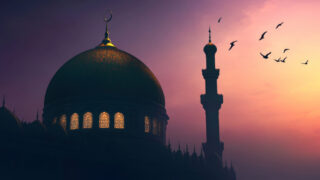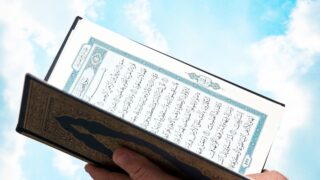Muslims who read the Quran with an open heart and understand the meaning of its word have no doubt that the Quran is the Word of God.
A non-Muslim approaching the Quran for the first time may legitimately ask: After all, is the Quran the word of God, as it is claimed?
By using the word “the Quran”, Muslims mean the original Arabic Quran revealed to Prophet Muhammad over fourteen centuries ago, and not any translation of it or its meanings.
This elementary fact may not be easily understood because Christians for example consider the English translation of the Bible as the word of God.
Lost in Translation
Translators choose words and phrases from their vocabulary in the target language, to express what they understand of the original text. And they may not fully succeed in expressing what they mean to convey; nor can they rule out the possibility of a different choice and order of words and phrases by another translator.
In the course of translation the casualty is always the typical idiom of the source language.
Even in the best translation, much of the power and appeal of the original text is lost. Robert Frost’s definition of poetry aptly paraphrases the predicament thus: “Poetry is what gets lost in translation.”
The point to be stressed is that “The Quran” is the Arabic Quran; and no human translation can substitute it.
Harmony between Content and Language
One of the first proofs of the Quran as the word of God is the perfect harmony between its content and language.
People may get to know the meaning of the Quran from a translation, preferably with sufficient explanations. But what about the language of the Quran?
Its beauty is to a great extent lost to any one who does not know Arabic.
The foregoing is meant only to point out the shortcomings of translations and not to decry all translations as utterly useless. In fact, a good translation may preserve somewhat of the charm of the original; and there is no question of ruling out translations as they are essential for non-Arabic-speaking people.
The passage below is quoted from the English translation of the meanings of the Quran by Yusuf Ali, who took immense pains to convey something of its beauty in English:
{Or, Who guides you through the depths of darkness on land and sea, and Who sends the winds as heralds of glad tidings, going before His Mercy? (Can there be another) god besides Allah? High is Allah above what they associate with Him! Or, Who originates creation, then repeats it, and who gives you sustenance from heaven and earth? Can there be another god besides Allah? Say, “Bring forth your argument, if ye are telling the truth!” (27:63-64)
{When the Sky is cleft asunder; When the Stars are scattered; When the Oceans are suffered to burst forth; And when the Graves are turned upside down; (Then) shall each soul know what it hath sent forward and (what it hath) kept back. O man! What has seduced thee from thy Lord Most Beneficent? (82:1-6)
The above verses appeal to hearts and minds at the same time; as there is a harmony of rhyme, rhythm and reason, a matching of powerful ideas with moving expression.
The Quran came at a time in Arabia when poetry was reigning supreme; but the master-poets of the day could not equal the Quranic richness in diction, style and beauty.
A Living Language
The Quran was able to hold the Arabic language in thrall from the moment it was revealed. Indeed its haunting rhythms rocked the whole Arabia from Sudan to Syria and from Morocco to Oman.
While the Quran continues to occupy the pedestal as an abiding model for literary Arabic, the languages of other scriptures had all become dead.
In fact, Arabic has defied the usual norms of the evolution of languages through history. The French scholar Ernest Renan (1823-1894), who had carried out extensive research on Semitic languages, had this to say about the Arabic language:
“The Arabic language is the most astonishing event of human history. Unknown during the classical period, it suddenly emerged as a complete language. After this, it did not undergo any noticeable changes, so one cannot define for it an early or a late stage. It is just the same today as it was when it first appeared.” (quoted by Khan).
In acknowledging this “astonishing event of human history” this French Orientalist, was in fact acknowledging the miraculous nature of the Quran. It was the Quran’s phenomenal literary style which preserved the Arabic language from alteration, such as other languages have undergone.
A Challenging, Transformational Book
There is no other book in human history that has molded, and is continuing to mold, the life of generations of people as the Quran.
Every verse of the Quran has become the unalterable source of a code of laws that govern every aspect of the life of Muslims.
This was a book that reformed and refined the lives of thousands of Bedouins who could not think of anything beyond the confines of their clans before; a book that transformed the camel-herds of Arabia into Caliphs and learned judges; a book that brought into being the renowned universities and centers of learning that awakened a new enlightenment in the world, such as no other civilization of the past could match.
Muslims consider it a brilliant and lasting miracle of God because Prophet Muhammad’s only source of inspiration for the revolution he brought about was the Quran.
With the Quran in his hand, Prophet Muhammad gave shape to the nucleus of a universal society in the Arabia of those days, out of those scattered and cantankerous desert tribes, who had little by way of scientific knowledge or material resources.
Their initiation into a stable Islamic cultural order was effected independent of all the socio-political systems or powers existing in the world at that time.
The Quran was at the center of this unique spiritual revolution. All the factors required for forging unity among tribes, races and social classes, for the liberation of thought patterns and the ennobling of knowledge. Indeed all the criteria for social transformation were derived from the very text of the Quran and from the culture that emerged from the Quran.
Even aggressors who ravaged Islamic lands and triumphed over the Muslims owing to their military superiority, lost their dominance in the end when they were confronted with the spiritual power of Islam; and eventually, many of them adopted the religion of the people they had conquered.
By Shahul Hameed
Works Cited:
“Quran – The Prophet’s Miracle”, Maulana Wahiduddin Khan. First Published: October 2007

















